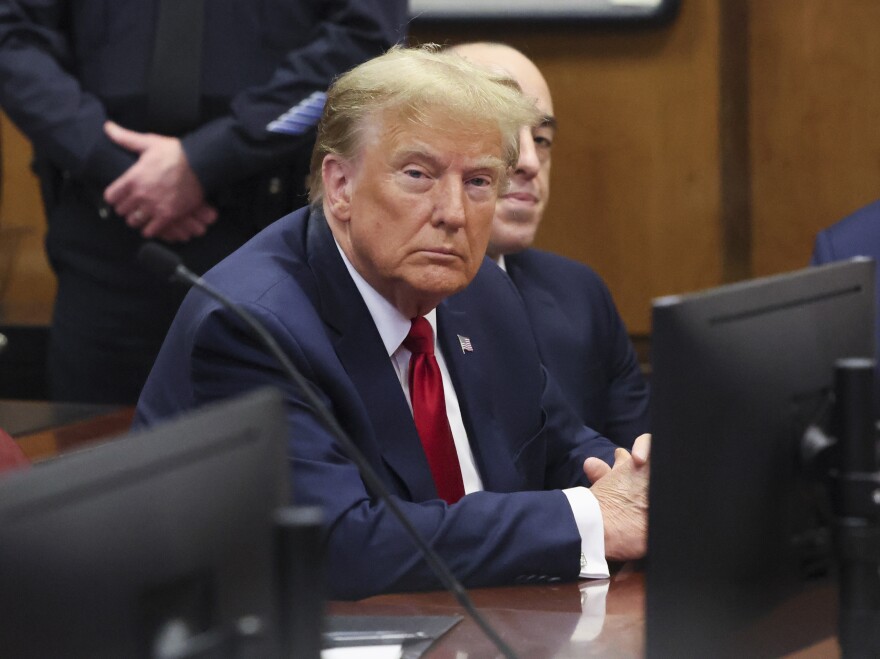Former President Donald Trump owes legal penalties totaling hundreds of millions of dollars in two civil cases recently decided in New York, raising questions about how he'll pay the staggering amount.
The short answer is that Trump, whose political persona is tied to his career as a wealthy businessman, will either pay himself or have other entities post bond on his behalf.
On Friday, a New York judge hit Trump with a $355 million fine after the judge found the Trump Organization had engaged in fraudulent business practices.
New York Attorney General Letitia James, whose office brought the case, said in a statement that when interest is factored in, Trump and other defendants owe more than $450 million overall — an amount "which will continue to increase every single day" until the judgment is paid, she said at news conference.
Three weeks earlier, a New York jury ordered Trump to pay $83 million for defaming writer E. Jean Carroll, who accused him of sexual assault in the 1990s.
All of that could put him over $600 million in penalties, says Jim Wheaton, a professor at William & Mary Law School who has studied corporate legal issues and Trump's finances.
Even though Trump plans to appeal both rulings, he still needs to meet appeal bond requirements within 30 days of each verdict, Wheaton told NPR's Morning Edition.
"[The Carroll] judgment was entered about a week ago, and so the 30-day appeal clock is running on that one," he added. "Both of these judgments have a potential impact on his cash."
The businessman-turned-politician has long boasted about his net worth, which Forbes estimates at $2.6 billion as of mid-February 2024.
In a deposition, Trump testified that he had about $400 million in cash assets, according to Wheaton, a figure that matches other reported estimates.
"He obviously has significant assets outside of that, but the liquid assets would be the first thing that you dispose of," Dan Alexander, a Forbes editor who has tracked Trump's wealth over the years, told NPR's All Things Considered. "And it doesn't take a strong mathematician to understand that that's not enough to pay the penalties he's facing."
How could Trump secure the funds?
The question of how Trump will pay the penalties is an urgent one.
"He basically has to put up or secure the cash for all of it in short order," Alexander explained.
Trump has long sought to capitalize off his legal woes, using the civil cases and the four criminal indictments he faces as opportunities to fundraise for his reelection — and to argue that he is being politically persecuted.
A lot of that money is going straight to his legal bills, as Trump paid tens of millions of dollars to his various lawyers last year.
Now some of Trump's supporters are donating specifically to help pay his $355 million fraud judgment, via a GoFundMe page created by Elena Cardone, the wife of investor Grant Cardone.
As of Tuesday afternoon, the fundraiser had pocketed nearly $700,000 — and had also sparked backlash on social media. GoFundMe responded to those calls on Monday by saying the fundraiser is "within our terms of service."
Trump himself is also trying a novel route to raise money.
The day after Friday's financial fraud verdict, Trump showed up at a sneaker conference in Philadelphia to unveil a line of golden high-tops, the latest in a line of Trump-branded goods he has hawked over the years (including wine, steaks and a board game).
The Never Surrender High-Top Sneaker, which Trump said had been in the works for over a decade, retails online for $399 a pair.
Further complicating matters, the judge in the fraud case placed what Wheaton described as "three levels of restrictions" on Trump's business practices.
The judge approved the continued oversight by an independent monitor, a former federal judge who basically has veto power over many Trump Organization actions, and required the Trump Organization to hire a new compliance officer.
He also temporarily banned Trump and his two eldest sons from leading their own businesses or applying for financing from any institution that does business in New York.
That "obviously limits the universe of potential financers for things like the bond, but also for additional financing for any of the Trump ventures," Wheaton explained.
What might the penalties mean to voters?
As far as what Trump's hefty legal penalties — as well as his ability to pay them — mean for his 2024 bid for the White House, Alexander doesn't think it will hurt his ability to run a campaign.
He notes that Trump has put none of his own money into his campaigns since 2016, despite being worth "more than almost anybody else running for office."
The bigger question, he says, is what it means to voters.
Trump's sweeps of early Republican primary contests, as well as his sizable lead in nationwide polls, suggest that his supporters aren't deterred by his legal woes.
But, Alexander said, "when you get into a general election, will people say, 'Wait a second — this is a guy who owes half of a billion dollars in legal penalties. Maybe he's not the right guy to run the country'?"
Trump, of course, also faces dozens of criminal charges in four jurisdictions. He's scheduled to be back in a New York court for the first of those trials next month.
Copyright 2024 NPR. To see more, visit https://www.npr.org.






